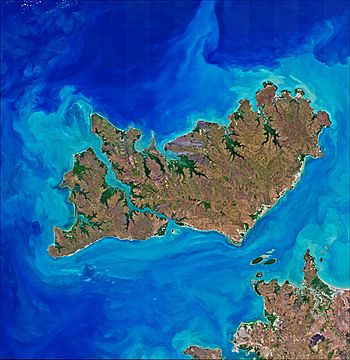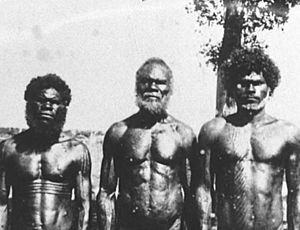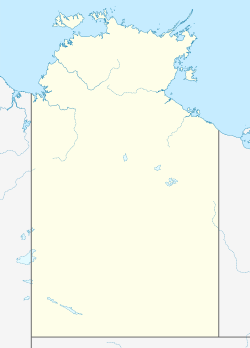Bathurst Island (Northern Territory) facts for kids
|
Native name:
Nguyu
|
|
|---|---|

Satellite image of the Tiwi Islands, Melville (top right) and Bathurst (left) with the Australian mainland (bottom right)
|
|
|
Bathurst Island (Northern Territory of Australia)
|
|
| Geography | |
| Location | Timor Sea |
| Coordinates | 11°35′S 130°18′E / 11.583°S 130.300°E |
| Archipelago | Tiwi Islands |
| Major islands | Bathurst, Buchanan |
| Area | 2,600 km2 (1,000 sq mi) |
| Administration | |
|
Australia
|
|
| Territory | Northern Territory |
| Largest settlement | Wurrumiyanga (pop. 1563) |
| Demographics | |
| Population | ca. 1640 |
| Pop. density | 0.63 /km2 (1.63 /sq mi) |
Bathurst Island, known as Nguyu in the local Iwaidja language, is a large island off the northern coast of Australia. It is one of the two main Tiwi Islands, located in the Northern Territory, alongside Melville Island. Bathurst Island covers an area of about 2,600 square kilometers (1,000 square miles).
Contents
Discovering Bathurst Island
Bathurst Island is home to several communities. The biggest town is Wurrumiyanga, located in the southeast. About 1,560 people live there. Wurrumiyanga was known as Nguiu until 2010. It is about 70 kilometers (43 miles) north of Darwin.
The second largest community is Wurakuwu, with about 50 people. It is located 60 kilometers (37 miles) northwest of Wurrumiyanga. There is also a small family outstation called 4 Mile Camp. It is about 6 kilometers (3.7 miles) west of Wurrumiyanga.
A Look at History

Aboriginal Australians have lived in the Tiwi Islands area for at least 40,000 years. Their culture and history are very rich.
Early European Encounters
On May 5, 1623, a Dutch explorer named Willem Jootszoon Van Colster arrived. He was on the ship Arnhem. He named the island De Speult Eylandt. This was to honor Herman van Speult, a governor who had sent him on the journey.
Later, in 1828, Scottish explorer John Clements Wickham renamed the island. He called it Bathurst Island. This name honored Phillip Parker King's ship, which had explored the area earlier. The ship itself was named after Henry Bathurst, 3rd Earl Bathurst. He was a British Secretary of State for the Colonies.
The Mission and Reserve
From 1910 to 1938, a Roman Catholic mission operated on the island. It was led by Francis Xavier Gsell. He was known for his work in helping young Indigenous girls. He helped them marry men of their own age. This was instead of marrying older men as was sometimes the custom.
On December 24, 1912, the entire island was declared an Aboriginal reserve. This meant the land was set aside for Aboriginal people. There were discussions about land for the mission and for farming. However, it was decided that the island should remain for the Aboriginal people. This was to protect their way of life.
World War II Events
Bathurst Island played a small but important role during World War II. On February 19, 1942, Japanese planes were spotted approaching. A priest named Ed Bennett saw the planes. He urged the local coastwatcher, John Gribble, to send a warning to Darwin.
Another missionary, Father John McGrath, also saw the planes. He sent a radio message saying, "An unusually large air formation bearing down on us from the northwest." However, the warning was not fully acted upon in Darwin. This was because some US planes were also returning. The Australian duty officer thought it was the same group of planes. Soon after, the bombing of Darwin began.
Bathurst Island in Film
Bathurst Island was shown in the 2008 film Australia, directed by Baz Luhrmann. In the movie, it was called Mission Island. The film showed Japanese soldiers landing on the island. However, this part of the story is not true. No Japanese troops landed on Bathurst Island during World War II.
Notable People from Bathurst Island
- Olive May Pearce
See also
 In Spanish: Isla de Bathurst (Australia) para niños
In Spanish: Isla de Bathurst (Australia) para niños
 | Delilah Pierce |
 | Gordon Parks |
 | Augusta Savage |
 | Charles Ethan Porter |


